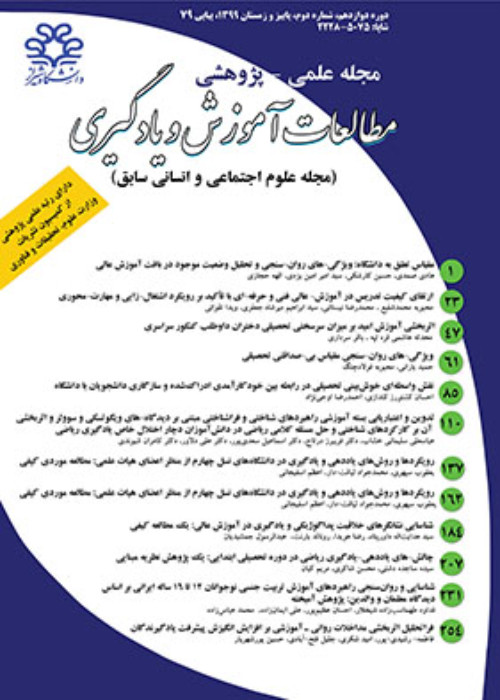Mother Patience and Child Aggression: The Mediating Role of Parenting Stress
Patience has been strongly recommended in religious texts as a moral virtue and as a coping strategy. Patience, of course, has been psychologically described as a completely natural tendency to help one stay calm in the face of suffering and thus can be one of the most powerful personal resources (Schnitker, 2012). Past research has correlated patience with a wide range of positive psychological outcomes in different groups and has even reported a correlation between mothers' patience and their children’s positive psychological outcomes (e.g., Zare & Farmani, 2017; Khormaee et al, 2016; Khormaee et al, 2014). However, it remains unclear how psychological mechanisms or mediators can link patience to different psychological outcomes. In particular, the mediating variables in the relationship between parental patience - especially mother’s - and the different psychological consequences of children have not been studied yet. Of course, parenting stress, which refers to some kind of discrepancy between parenting needs and individual parenting resources (Essex et al, 2002), has always been introduced as a significant mediator between the parents’ mental statuses and the developmental consequences or behavioral problems of their child (Fredrikson et al, 2019). In fact, the amount of parenting stress demonstrates the extent to which the parent has tolerated or managed the parenting experience based on his or her own resources (Deater-Deckard, Li & Bell, 2016). However, despite repeated research showing the impact of parenting stress on children's behavioral problems, as well as studies showing the correlation between patience and various psychological outcomes, there has been no research to investigate the relationship between maternal patience and child behavioral problems, most specifically, through an examination of the mediating role of parenting stress. Therefore, the purpose of the present study was to investigate a model in which maternal parenting stress is introduced as a mediating variable in the structural relationship between maternal patience and child aggression.
The patience of the mother through parenting stress can predict the child's aggression.
The present research is descriptive (non-experimental) and the research design is a correlation model. The statistical population consisted of all the mothers of preschool children in the city of Kazerun. A sample of 200 mothers was selected from the cluster sampling method. To this end, five preschools were randomly selected and then from each center, two classes were randomly selected and all the mothers of the children in those classes were evaluated. However, after deleting questionnaires that were flawed, a final sample of 193 mothers was formed. The software used in this study was SPSS 22 Extended Abstracts of the Persian Articles in English and AMOS 22. The research tools consisted of Adult Patience Scale (APS), a short form of Parenting Stress Index (PSI) and Child Adaptive Behavior Inventory (CABI).
To determine the share of components of patience in predicting the child's aggression score and the mediating role of parenting stress, the statistical method of path analysis with structural equation modeling was used. The result showed that mother’s reflection is the only variable that directly leads to a negative and significant prediction of the child's aggression. However, maternal perseverance appeared as the only component to significantly predict maternal stress, and its impact was found to be negative. Parenting stress, in turn, positively and significantly impacted the prediction of child aggression.
Research findings showed that of the various components related to maternal patience, the mother’s delayed gratification and perseverance were the only predictors of the child's aggression score; while both variables had a negative impact on the dependent variable, the effect of the former was direct but the latter indirectly affected child aggression score through the mediation of parental stress. This finding is consistent with those of other studies, including Izadi Taame et al. (2009) and Khormaee et al. (2014). In order to justify this, one may consider the component of perseverance. Perseverance is a part of patience that returns to the person standing over time and not leaving the subject or position behind him. With Khormaee et al. (2014) showing a strong correlation between perseverance and hope for the future, it can be argued that the mother's perseverance made her hopeful to continue upbringing her child in spite of all parental problems and the child’s improper behavior. The study findings further indicated that the component delayed gratification directly predicts the child's aggression, negatively and significantly. In explaining this finding, one can also refer to the definition of the variable, which, refers to a kind of ability to delay the response. People with the ability to delay gratification, by recognizing their immediate and harmful emotions, endure the failures or discomforts arising from interpersonal relationships; In other words, such people by delaying their immediate responses at the time of aggression, try to find a more constructive solution to the problem. Accordingly, the direct impact of this feature of mothers on their children’s aggression can be justified in terms of the children modeling this behavior of their mothers in delaying their immediate responses to challenging situations.
- حق عضویت دریافتی صرف حمایت از نشریات عضو و نگهداری، تکمیل و توسعه مگیران میشود.
- پرداخت حق اشتراک و دانلود مقالات اجازه بازنشر آن در سایر رسانههای چاپی و دیجیتال را به کاربر نمیدهد.



